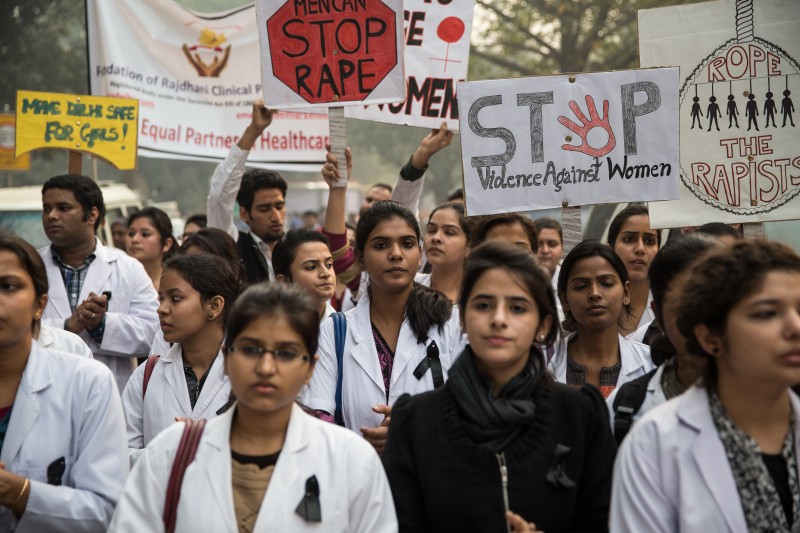 [1]
[1]India marked the one-year anniversary in 2013 of the brutal rape of a young university student, which plunged India into a period of self-reflection and mourning whilst thousands took to the streets of Delhi in protest against gender-based violence.
Debate has erupted once again in India surrounding the issue of rape in the country, this time spurred by British director Leslee Udwin's documentary ‘India's Daughter [2]‘ about the brutal gang rape and murder of aspiring physiotherapist Jyoti Singh Pandey in 2012 in Delhi.
The film shows one of the convicted rapists, Mukesh Singh, saying women are more responsible for rape than men, and that women shouldn't fight back when being raped. Two defense lawyers who also appear in the documentary spew similarly sexist and violent thoughts about women in India.
Before it was even shown, the film faced accusations of showing India in a bad light, that it was made in poor taste or that it treated the issue insensitively. Some even called it fake [3].
The right-wing Bharatheeya Janata Party government, led by Prime Minister Narendra Modi, stepped in and procured a court order banning its release in India by citing “objectionable content”. Originally, the BBC had scheduled the documentary to air on International Women's Day, March 8, but it moved forward [4] the release to March 4 and published the film in its entirety on YouTube [5]. The Indian government then requested that YouTube block access [6] to the film within the country, and the site complied.
@IndiasDaughter [7] is the saddest reality while we're busy saying”happy”women's day..crime is in the mind ..The thought . We MUST change that !
— Chitrangda Singh (@IChitrangda) March 8, 2015 [8]
The documentary mainly focuses on Mukesh Singh, who is behind bars, sentenced to be hanged for his role in Jyoti Singh Pandey's rape on a moving bus on December 16, 2012. She succumbed to her injures two weeks later. It also relies on interviews with her parents and the defense lawyers.
Criticism aside, questions were raised across social media as to why the government would ban the documentary.
To protest the ban, popular news channel NDTV, which was supposed to air the film, ran a black screen with the film's title during the hour-long slot on March 8 when it was scheduled to air.
Explaining why the channel decided not to broadcast an alternative show, editorial director Sonia Singh said in a tweet:
We won't Shout but we will be Heard @SharmaKadambini [9]: #IndiasDaughters [10] 9pm to 10pm pic.twitter.com/UKfqtTImL7 [11]”
— sonia singh (@soniandtv) March 8, 2015 [12]
Crimes against women are certainly a problem in India. According to the National Crime Record Bureau [13], every 20 minutes, a woman is raped in India. Since 2010, reported crimes against women, including rape, have increased by 7.1 percent.
At the same time, the film isn't perfect. GV contributor Annalisa Merilli [14] pointed out some of the basic flaws in the narrative of the documentary on news website Quartz:
The documentary lacks the strength to point to the roots of the problem. Take the title, India’s Daughter. Why? Isn’t that a quintessentially patriarchal label to give Jyoti Singh? She wasn’t India’s daughter. She was India’s promising medicine student. She was Delhi’s fierce citizen, who would stop a policeman from beating up the kid who just stole her purse. She was the fearless woman who stood up against the men who would then kill her—because she would not take being bullied, she would not just do as she were told.
Kunjila Mascillamani, a film student at the Satyajit Ray Film and Television Institute in Kolkata, wrote on her blog [15] that while the film is not perfect, that's no reason for it to be banned:
Nothing artistic about it. Moreover it is somewhat like Slumdog Millionaire in that it looks at India as a third world nation sinking in poverty and anti-social activities. A country which needs reformation. Glee at an opportunity to criticize a former colony is rather evident. India of slums, youth dropping out of school to earn a living, women who only seek protection from husbands- the sketch is just perfect.
[…]
I am not India's daughter. I don't think Jyoti Singh was either. India is in fact Mukesh Singh. I cannot adhere to anything which originates there. Neither as a woman nor as a human being. In this festival colours [I] am with a ‘foreign’ film. A mediocre one which posed threat to state, a film which made me part of a conspiracy. Jyoti Singh, today, [I] miss you.
Taking a look at the conviction rate of rape [16], India stands tall with an ‘impressive’ 24.2 percent (2012) compared to the UK's 7 percent and Sweden's 10 percent. Then why does rape continue to be a problem?
Gender inequality thrives in India, according to Anjali Joshi in the Huffington Post [17]: “This is no pathogenic case of victim-blaming. This mentality has been bred in Indian culture as a result of generations of gender inequality. These rapists were not “rotten apples in the barrel”; rather, their way of thinking is not far from the cultural norm in India.”
Questions need to be asked at all levels of Indian society about how to rid India of this gender inequality that has gripped its very roots. Where to begin? Popular actress Twinkle Khanna tweeted in a few words on what needs to be done as a society:
It starts from aborting the girlchild to raping & killing women.We are raising tomorrow's men in our homes today.Raise them right India.
— Twinkle Khanna (@mrsfunnybones) March 5, 2015 [18]